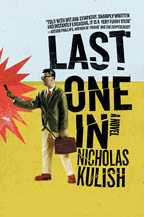|
|
|
BOOKSHELF
Nicholas Kulish ’97 Covers the Iraq Invasion His Way
By Alia Malek ’06


Nicholas Kulish '97
PHOTO: SARAH SHATZ

To Nicholas Kulish ’97, The New York Times’ Berlin bureau chief, writing an account of his few months in 2003 as an embedded journalist in Iraq seemed presumptuous and self-important. “I never really wanted to write a memoir about the war,” he said in a July interview on NPR’s All Things Considered. Though his colleagues were taking notes for nonfiction books, Kulish had a different impulse. “I guess I’m sitting in the back of the classroom,” he explained, “rolling my eyes, and wanting to roll up a little Mark Twain-style spitball.” No surprises, then, that his Iraq book, Last One In, published in July by Harper Perennial, was a witty, well-received satirical novel.
Kulish’s protagonist, Jimmy Stephens, isn’t even a foreign correspondent — he’s a naive gossip columnist for a fictional New York paper, the Daily Herald. Through a combination of bad luck and carelessness, Stephens reports a piece of lascivious but untrue gossip about a married celebrity hooking up with a waitress in a bathroom stall at Nobu. An angry lawsuit ensues. What saves Jimmy from being fired is the less-than-happy coincidence that he shares the same name as the paper’s legendary war correspondent, James Stephens, who has been hit and therefore sidelined by a delivery truck in Manhattan. The Pentagon won’t accept any last-minute substitutions from the paper, so the editor-in-chief resorts to defrauding the Defense Department. Thus Jimmy flies off on the other Stephens’ clearance, visa and destiny.
At first, Jimmy finds himself in limbo in Kuwait, trudging through advance briefings, vaccinations and training. Kulish uses the opportunity to offer a send-up of certain media types: the foreign correspondents who trade stories of conflict zones as if they were combat veterans themselves, the network reporters fretting more over their airtime than their safety, the tough cameramen and women who silently hold their teams together. Mainly, though, the book stays with Jimmy and the Marines with whom he’s embedded. Kulish admits to putting more effort into developing those characters, having felt some obligation to show the Marines as human beings — both contradictory and nuanced. (The Washington Post praised Kulish’s “pitch-perfect ear for the musical crudity of Marine banter.”)
Though the novel was well received by critics, its first readers in the publishing world were far from sanguine. This could have been cause for concern: Kulish, with the help of a Fulbright grant, had quit his job as a Washington, D.C., correspondent at The Wall Street Journal to write the book. The novel, his first published one, took him eight months to write (though he continued to polish it for some time). In 2004, when he first shopped it around, he was told by agents and publishers that readers weren’t ready for anything critical about the Iraq war, especially in the wake of Abu Ghraib. One agent even called the book “unpatriotic.”
But the agent he ended up with, Marly Rusoff of Marly Rusoff & Associates, persevered. Kulish went back to work at The New York Times, joining its editorial board. And finally, after two years, the novel was sold. The reviews more than justified his perseverance. Master satirist Christopher Buckley, in The New York Times, called the novel “a very good book, funny, harrowing and sympathetic.” Entertainment Weekly graded the book A- and The New Yorker called it a “clever, affecting novel,” which portrays the Iraqi conflict as “a cruel, mismanaged catastrophe from the first shot.”
There’ve been many changes for Kulish this summer: leaving the editorial board, marrying Lauren Reynolds ’00 and moving to Berlin, where he spent a semester while an undergraduate. He’s already at work on another novel. His College daydream — which he calls his Hemingway fantasy — of being a novelist and foreign correspondent would seem to have come true. Looking back, he credits the University with, at the very least, his taste for city life: “Columbia turned me into an urban person, who wanted to see the big cities of the world. Since Columbia, that’s been my life — New York City, Washington D.C., Hong Kong, Berlin.”
Alia Malek ’06J is a writer living in New York City.
|
|
|







